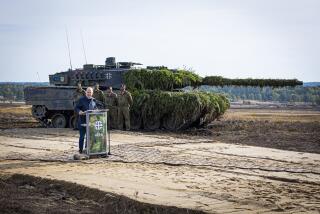American Readiness: What If a New Cold War Develops? : Threat from Russia would be less than it was, but formidable nonetheless
- Share via
Beneath the icy waves of the Barents Sea a U.S. submarine collides with a sub from the Commonwealth of Independent States. The accident, says a U.S. Navy spokesman, occurred during a routine patrol in international waters. A Russian press report claims, on the contrary, that the American vessel was in Russian territorial waters. Meanwhile, at the Pentagon, planning proceeds for possible wars. One contingency reportedly envisions a Russian invasion of Lithuania and a U.S. military response. The old Cold War, as everyone knows, is over. But is Cold War II now quietly getting under way?
FUTURE SHOCKS: The continued shadowing of the former Soviet fleet as well as the Pentagon’s war planning can be regarded as simple strategic prudence. It would be foolish not to stay aware of what the former adversary’s armed forces are up to, and it makes sense to be prepared for any confrontation. The late Soviet Union is no longer an enemy, but the component parts into which it has fragmented are far from stable in their politics, meaning that for now a large element of unpredictability hangs over the coming years. Across the continental sweep of the former Soviet Union millions of men remain under arms, thousands of nuclear-armed intercontinental missiles remain in place. In these circumstances it’s best in military planning not to confuse the present moment with the unforeseeable future, not to take anything for granted.
But realistically it’s hard right now to regard Russia, alone or allied with other former Soviet republics, as a plausible international threat. “There has been a degradation of the former Soviet Union’s military capability,” says Defense Secretary Dick Cheney, that is “not going to be reversed in the short term.” Among signs of that degradation:
The navy is so bereft of spare parts and fuel that most of its ships must remain in port.
Ground forces have not held major maneuvers since 1989. Meanwhile, draft calls are increasingly ignored; demoralization spreads; the army, which used to volunteer its labor for such tasks as road building and harvesting, now demands payment for its services.
The collapse of the Soviet Union and the refusal of Ukraine to participate in a unified military command play havoc with transportation and logistics capabilities. At the same time Red Army units have either been withdrawn from Eastern Europe or have been so weakened that they are regarded as militarily ineffective. The independence of the Baltic states and Ukraine in effect has pushed the Red Army back to pre-1940 positions.
CURRENT WORRY: A possible, even serious, military danger nonetheless exists, though it is chiefly internal. Last month nearly 5,000 angry military officers met in Moscow to demand a better break for the armed forces. The military is suffering deeply from a failing economy that has left many soldiers and their families miserably housed, inadequately fed and without prospects in the civilian sector. It is suffering as well from a loss of self-esteem, the result of the rapid deterioration of a once-awesome military machine. Fears are increasing that there will be a swing toward a populist-based dictatorship if economic reforms fail. Military officers could be counted on to be prominent in such a move.
Such a military-supported coup would automatically raise the perceived threat level to Europe or the United States. The greatest danger would come from a reassertion of Russian nationalism, possibly including an effort to restore by force Russian dominance over the former empire. That in itself would send international tensions soaring, and tensions provoked by any nuclear power are always something to be concerned about.
How does all this affect the U.S. military posture, whose future is soon to become the subject of a great debate in Washington?
For more than 40 years the key word is shaping the mission and capabilities of U.S. armed forces was deterrence, the ability to credibly threaten the destruction of the Soviet Union if it attacked Western Europe or the United States. The too easily forgotten corollary of the long Cold War is that it produced, in the case of the superpowers, a long peace. Credit deterrence for that achievement.
Deterrence must remain the imperative when the United States assesses the prospect that a military-nationalist coup might one day restore Russia to a menacing international posture. That means maintaining sufficient strategic nuclear and ground forces to dissuade aggression, along with whatever other forces are deemed necessary to respond to regional conflicts. American forces can shrink, in other words, but we must avoid the mistake of bringing them down to a level where their battlefield effectiveness and strategic credibility are imperiled. The Cold War may be over, but realism compels recognizing that the instability in its wake could go on a long time.
More to Read
Sign up for Essential California
The most important California stories and recommendations in your inbox every morning.
You may occasionally receive promotional content from the Los Angeles Times.













